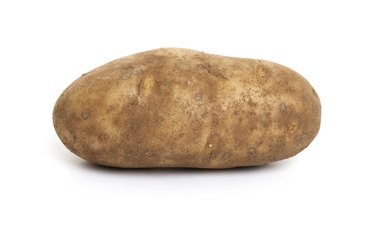
A spud that contains more starch is the best choice for the light, fluffy mashed potatoes many Americans prefer. But a potato with less starch is a better choice for creamier mashed potatoes with the consistency of a very thick soup. Russets, Yukon golds and numerous other types of potatoes vary in their starch content. Determine how you want your mashed potatoes to taste, then choose the right spud for the job.
Why Starch Matters
Video of the Day
Each stroke of a mashing tool bursts the starch granules in potato cells, incorporating more exposed starch into mashed potatoes. Starchy potatoes fall apart easily and require less mashing; you burst fewer starch granules when you work them, which yields a fluffier mash. All-purpose potatoes require more mashing to expose starch into the mixture, which yields a creamier mash. Waxy potatoes require the most work and yield the densest mash. Take care not to overwork potatoes, which exposes too much starch and makes them paste-like. Use a potato masher or ricer, stopping as soon you start to achieve the desired consistency.
Video of the Day
Russets Best for a Fluffy Mash
High-starch potatoes are generally drier and more mealy than other spuds. They also absorb cream and butter more readily than their less-starchy counterparts. Russet potatoes -- brown-skinned baking potatoes -- are very starchy, and they produce light, fluffy mashed potatoes. Russets may also be labeled Idaho potatoes. The Russet Burbank, Russet Norkotah and Ranger Russet are some of the most common varieties.
All-Purpose Spuds for Flavor
All-purpose potatoes have more robust flavors and creamier textures than starchy spuds. All-purpose Yukon golds have a naturally buttery taste ideal for mashed potatoes. Yellow Finn potatoes also have a buttery flavor, but they are slightly sweeter than Yukon golds. Kennebec potatoes are savory white-fleshed potatoes with a slightly fluffier texture than most other all-purpose potatoes. Yukon golds are widely available in most supermarkets, while Yellow Finns and Kennebec potatoes are available in some supermarkets and readily available at natural foods stores and farmers' markets.
Waxy Potatoes for a Dense Mash
Waxy potatoes require the most mashing, which makes them the easiest types to overwork. Choose larger red-skinned varieties, which contain enough starch to yield delectable mashed potatoes if you enjoy a denser mash with lumps. Red Bliss, Norland Red and Red Pontiac are commonly available varieties that mash well. Many supermarkets label red potatoes as "new potatoes," which is a general term for any spud harvested before it reaches maturity. Select the largest individual red-skinned potatoes available, which have the highest concentrations of starch.
The Best of Two Potatoes
Many cooks prefer blends of two varieties in mashed potatoes. For example, combine Russet Burbanks and Yukon Golds to create a mash that has some of the fluffy texture associated with high-starch russets and some of the more savory, buttery taste associated with creamier all-purpose potatoes. Pair starchy potatoes with all-purpose potatoes so that they boil and mash at similar rates.
- Serious Eats: Ultra-Fluffy or Rich and Creamy Mashed Potatoes
- The Kitchn: The Best Potatoes for Mashed Potatoes
- Fine Cooking: Picking the Perfect Potato to Mash, Bake or Boil
- Culinary Institute of America: Potato Types Guide
- Fine Cooking: Russet Potatoes
- The Kitchn: Sixteen Potato Varieties
- Cook's Illustrated: Thanksgiving Potatoes Guide
- Fine Cooking: Red Potatoes